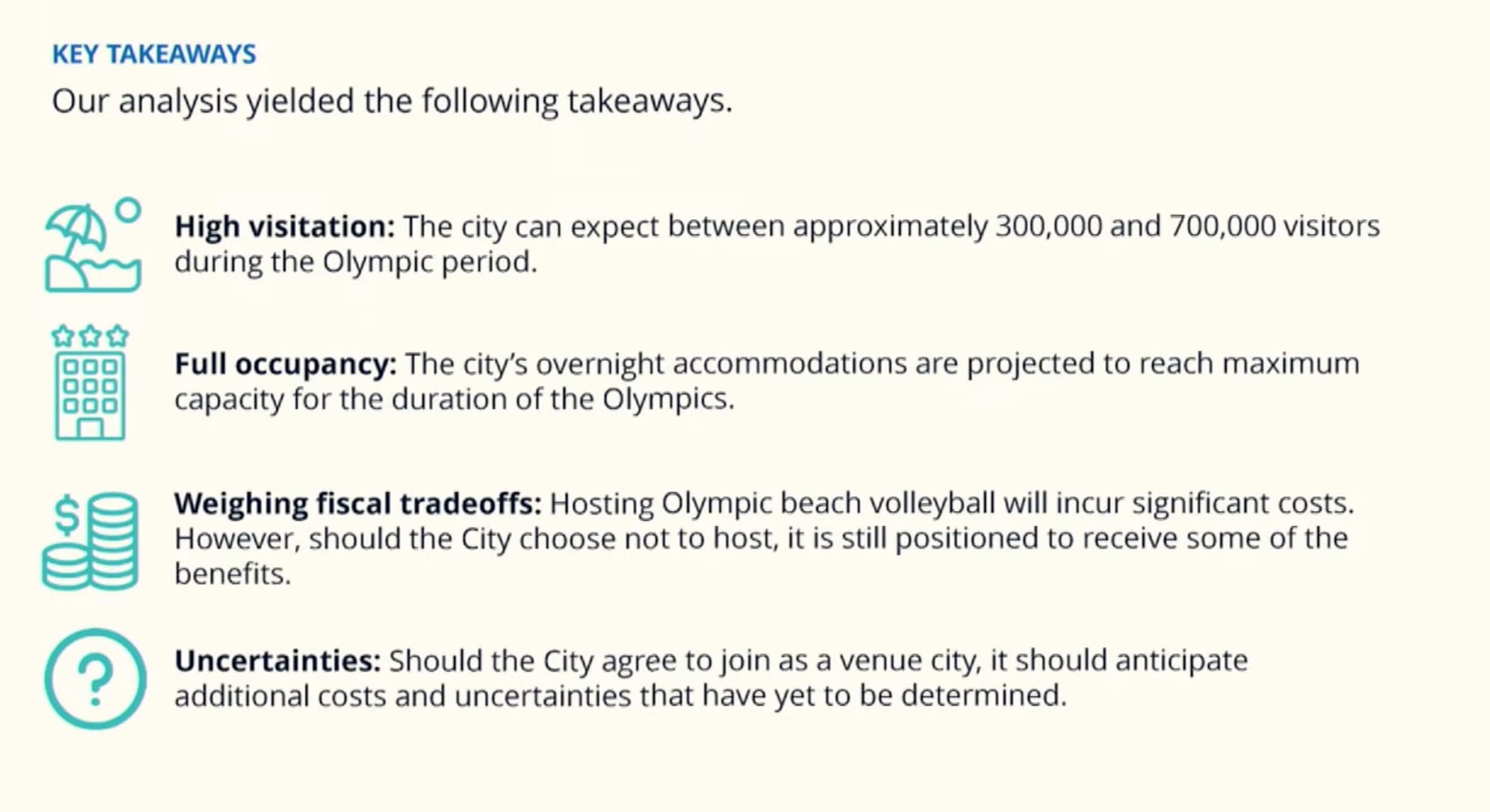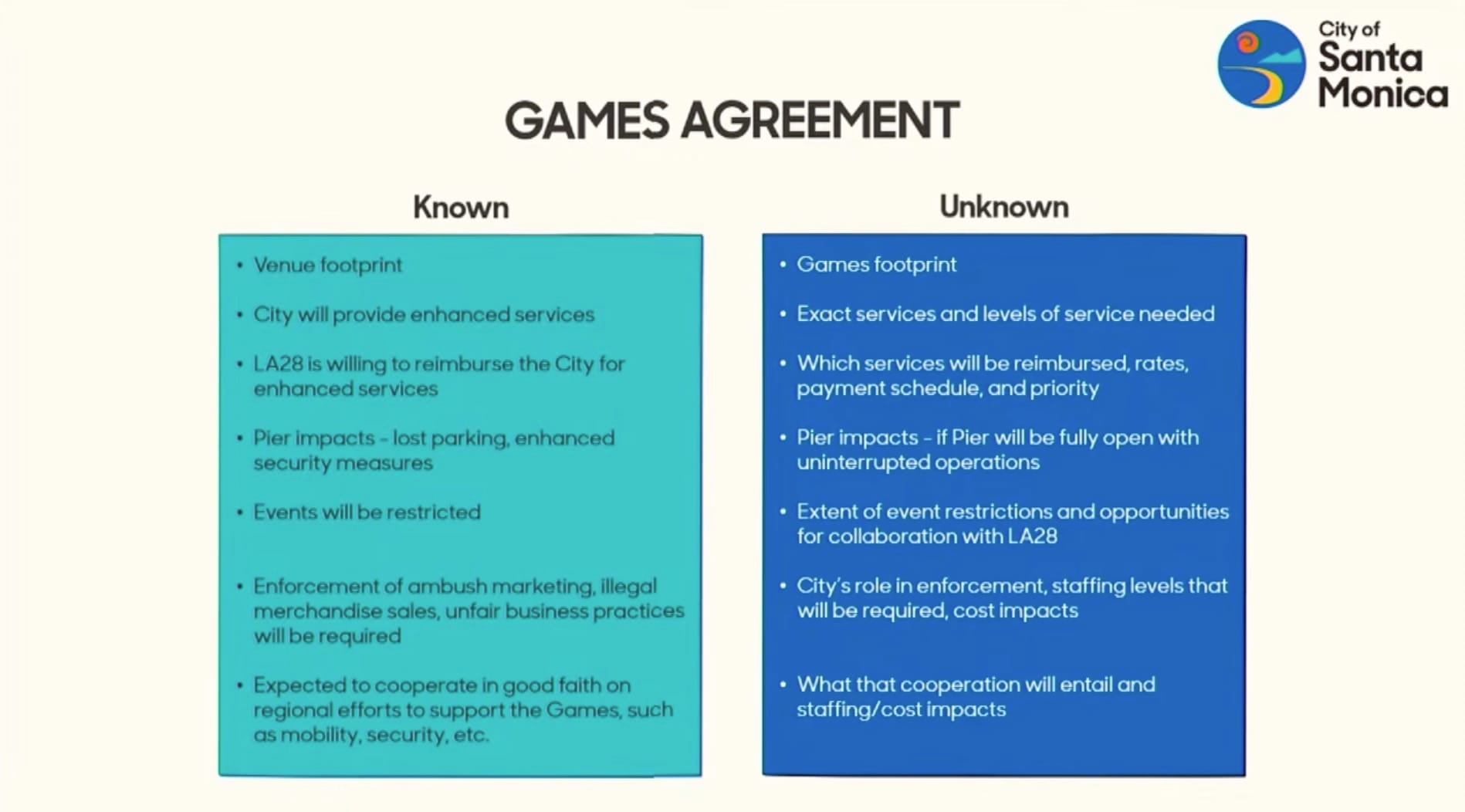The nuts and bolts of hosting the Beach Volleyball tournament in the 2028 Olympic Games were laid bare in Tuesday’s City Council meeting where nostalgia struggled against a seemingly overwhelming number of unsatisfactory elements to the LA28 agreement.
Memories of Los Angeles 1984 and the potential legacy of being part of the Olympic Games in just four short years were about the only thing that saved the agreement from LA28 from being rejected as councilmembers agreed to continue negotiations with the LA28 organization.
Melissa Spagnuolo, Community Partnerships Manager for the City of Santa Monica gave an enlightening presentation, diving into the pros and cons of hosting such an event. However, from the outset, it became obvious that the cons were both significant and sizable in number.
They included, but absolutely were not limited to, not knowing how operations would be affected on the Pier, known financial risks with an unknown magnitude and no revenue-generating opportunities such as sponsorships, co-branding, and public or private events without prior written approval from the IOC. That said, the City is required to give LA28 a priority option to purchase up to 100% of the City’s advertising space.
"[Another issue] that has come up continuously … when I have spoken to people in the community, and that's the community benefits," Spagnuolo said, adding, "So, currently in the games agreement, there are no community benefits being offered."
"When the city has negotiated agreements with Cirque du Soleil, for example, or the MLB All Star game that was on the beach a couple summers ago. There [was] a list of community benefits that were negotiated as part of those agreements … and we can only assume that [here] there are none," Spagnuolo said, adding, "But I would like to say that even though there's no tangible community benefits being offered, there would be intangible benefits from hosting, such as community pride of being part of the Olympics."
Mark Kubaczyk from HR&A Advisors, a national consulting firm that specializes in economic development, explained that the potential net fiscal impact across two scenarios had been evaluated: an "Event Scenario" where impacts from the beach volleyball event and broader Olympic visitation were considered and a "Non-Event Scenario" where impacts only from broader regional visitation during the Olympics were considered.

In his succinct analysis, Kubaczyk pointed out that hotels, hostels and other accommodations would reach maximum capacity during the peak tourist season regardless of whether the City chose to host the beach volleyball event.
He went on to explain that in an Event Scenario, the anticipated revenue of $14.09 million would be eclipsed by a projected $15.54 million cost, leaving the City $1.45 million in debt. In a Non-Event Scenario, the revenue was less at $11.3 million, but the costs were significantly less at $650,000, leaving the City $10.5 million better off.
"Looking at this from an incremental standpoint, thinking about the loss in the Event Scenario, as well as the opportunity cost of revenues potentially lost in the Non-Event Scenario, the cost of hosting for the city is roughly $12.1 million," he said.
Councilmember Jesse Zwick opened up the questioning by asking how the situation regarding the Pier and the fact that it might not be able to operate as per normal had changed from a previous situational analysis, to which Spagnuolo replied that it was connected to the Department of Homeland Security and potential security issues.
Zwick also asked arguably the most important question, what would happen if Council voted to proceed with this first agreement and then decided later on in the process that perhaps the arrangements weren’t favorable to the City of Santa Monica after all? To which Susan Cola, Assistant City Attorney responded, "It does set the framework for the negotiation, so it would be hard to deviate from the framework."
"If we deviate from the parameters of the framework, potentially we could be viewed as breaching the games agreement … On the other hand, if we are acting in good faith and … there is a dispute resolution procedure, it is subject to binding arbitration the way it is now, so it [would] have to be worked out," Cola said.
Councilmember Gleam Davis narrowed in on several small, but significant issues, like potential federal reimbursement, the sale of licensed merchandise and even if events could be organized away from the actual tournament site and frankly, the answers were not encouraging with little in the way of positive response.

Vice Mayor Lana Negrete asked Spagnuolo if any members of the LA28 organization, some of whom were in fact sitting in chambers, would be prepared to speak publicly either now, or at a later date to assist in the act of transparency and community outreach. Spagnuolo looked toward the seating area and replied, "No."
Negrete pushed to seek actual opinion, asking, "Have you ever seen an agreement like this?" adding, "This is a horrible business deal, right? Being asked to sign something with a bunch of unknowns that have severe financial impacts with really no financial gain."
Cola responded, "No, we've never entered into that kind of an agreement [before]."
Through somewhat limited back and forth discussion, Negrete clarified that if the City was to host, then local businesses would be extremely limited in using any signage whatsoever that related to the Olympic Games without IOC approval. Sadly however, it was impossible to find out how easy or difficult that would actually be because no one from LA28 was willing to speak.
Councilmember Caroline Torosis clarified that "If lLA28 is financially unsuccessful, Santa Monica has literally no recourse to get reimbursed … and we don't know where we would be in a waterfall of all the other cities waiting for reimbursement."
She then drew comparisons to how differently the Paris organizers handled the community benefits. "It's my understanding that Paris signed their social compact in 2019 with very robust community benefits, local hire provisions etc – 2019 being five years in advance of the games, laying out a specific plan for community benefits that would benefit the entire region hosting the games. Has LA28, despite the fact that we can't see any specific benefits for Santa Monica, shared their plan for community benefits regionally?"
Spagnuolo responded, "They have not shared that with us."
Following comments from the dias where each councilmember agreed how nice it would be to play a part in history in 2028, they also all agreed that more work needed to be done, including an increased public presence and improved offering of community benefits from the LA28 organization.
+++UPDATE+++ According to City staff, this item will not be brought back to Council as an administrative item on October 22 for a vote as was implied. It is not yet known the next time it will be bought before City Council for any additional discussion or vote.
scott.snowden@smdp.com

